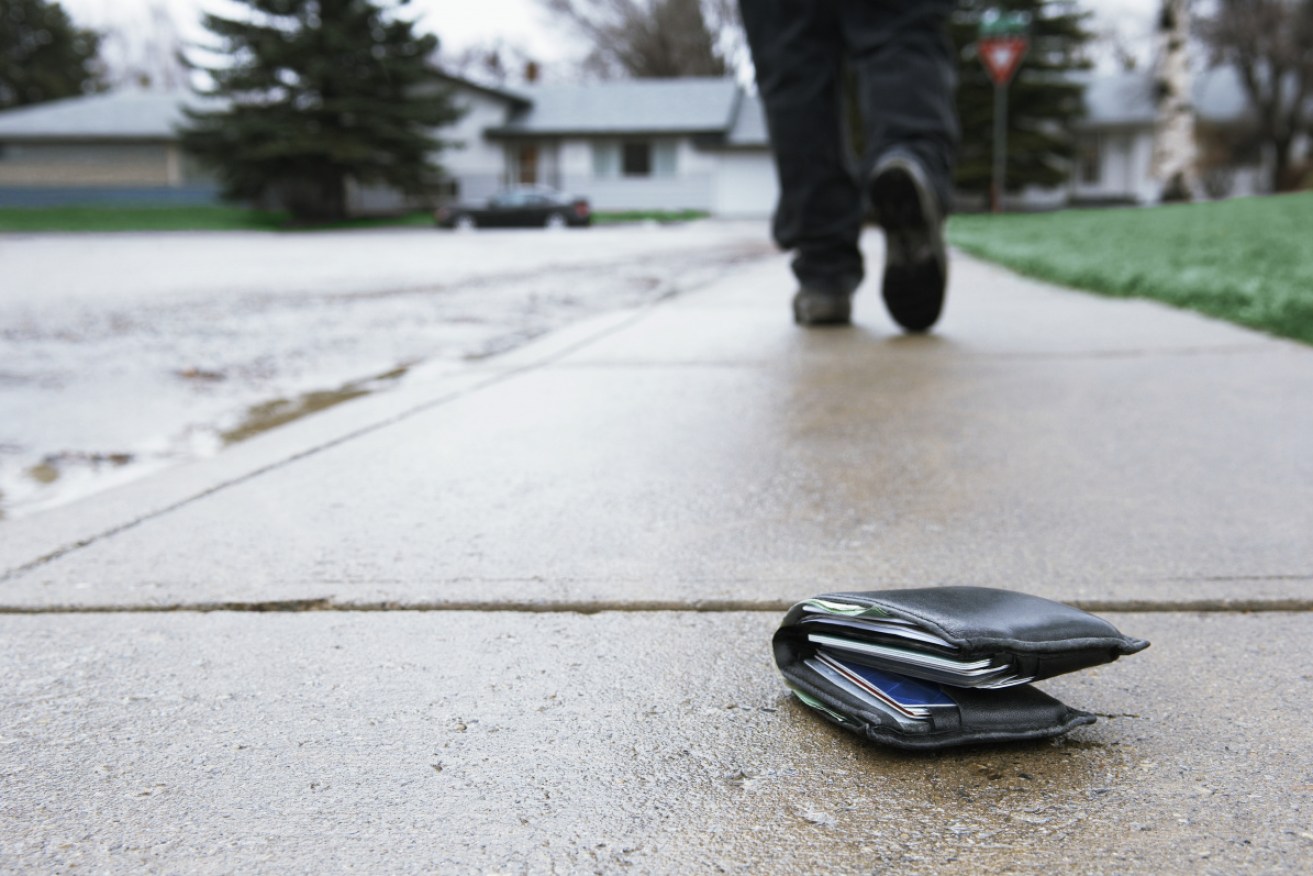Would you return a lost wallet? New study’s surprising findings

A new study found that people are more inclined to give back a lost wallet if there is money inside. Photo: Getty
It’s obvious: Someone finding a lost wallet is less likely to return it if money is inside, right?
That’s what top economists, as well as regular people, usually predict, given what most of us assume about human nature. But according to a clever new study involving thousands of people in 40 countries, what most of us assume about human nature is wrong.
The three-year study, possibly the largest real-world test of whether people behave honestly when given incentives not to, found they are actually more likely to return lost wallets containing money. And the more money, the better the chances people will return it.
Experts say the study, published Thursday in the journal Science, suggests that policymakers and businesses might better prevent dishonest behaviors like lying on tax returns by using moral carrots instead of punitive sticks.
“It shows that when we make a decision whether to be dishonest or not, it’s not only ‘What can I get out of it versus what’s the punishment, what’s the effort?’ ” said Nina Mazar, a behavioral scientist at Boston University who was not involved in the study.

Against expectations, wallets with cash were returned more often. Photo: Getty
“It actually matters that people have morals and they like to think of themselves as good human beings.”
For the study, researchers planted 17,303 wallets in 355 cities on every continent except Antarctica. The American segment, conducted in 2015, involved 25 cities including Albuquerque, New Mexico; Chicago; Memphis, Tennessee; and New York.
The wallets, transparent business card cases with contents instantly visible, contained three business cards with a male name common to that country (Dimitri Ivanov for Russia, Tono Hendrianta for Indonesia, Peter Kihiga for Kenya). The American names were Brad O’Brien, Brett Miller or Connor Baker.
Each business card listed an email address and identified the man as a freelance software engineer so people wouldn’t try contacting employers.
Each wallet also contained a key and a handwritten grocery list in the native language: milk (or a locally analogous drink), bread, pasta (or rice or noodles), bananas. Some wallets had no money inside; some had $13.45 in local currency, adjusted to a comparable value for each country.
Research assistants walked into post offices, hotels, police stations, banks, museums or similar places, approached someone at the reception desk and said “Hi, I found this on the street around the corner.” They slid the wallet toward the person, saying “Somebody must have lost it. I’m in a hurry and have to go. Can you please take care of it?”
In all but two countries, more people emailed to return wallets containing money than cashless wallets. Only Peru and Mexico bucked that pattern, but those results were too slight to be statistically significant, the researchers said. On average, 40 per cent of people given cashless wallets reported them, compared with 51 per cent of people given wallets with money.
Researchers were surprised. But then they ran the experiment again in three countries (Poland, the United Kingdom and the United States), adding “big money” wallets containing $94.15. The difference was even starker. Way more people emailed to return the wallets with the larger amount: 72 per cent compared with 61 per cent of people given wallets containing $13.45 and 46 per cent of people given cashless wallets.
Why?
“The evidence suggests that people tend to care about the welfare of others and they have an aversion to seeing themselves as a thief,” said Alain Cohn, a study author and assistant professor of information at the University of Michigan.
People given wallets with more money have more to gain from dishonesty, but that also increases “the psychological cost of the dishonest act.”
Christian Zünd, a doctoral student and co-author, said a survey they conducted found that “without money, not reporting a wallet doesn’t feel like stealing. With money, however, it suddenly feels like stealing and it feels even more like stealing when the money in the wallet increases.”
Research assistants recorded the gender, age and friendliness of each recipient, how busy they were, whether they had computers handy to send email, and whether co-workers, security guards or cameras could have observed the wallet handoff (possibly making the person feel more compelled to return it). None of these factors mattered, they found.
People reporting lost wallets received an email thanking them and saying the owner had left town and they could keep the money or donate it to charity. But, the researchers wondered, if the wallets were actually collected, would people turn them in but keep the money?

It seems most of us don’t harbour an inner criminal, like this ATM bandit. Photo: AAP
So they tested that in Switzerland, which has relatively little corruption, and the Czech Republic, which ranks at the opposite extreme, Cohn said. In both countries, nearly all the money was returned with the wallets, except for some change, which they think accidentally fell out.
Mazar, who’s studied people’s honesty in laboratory experiments, said that altruistic result underscores people’s concerns about self-image. “Taking the money and returning the wallet would make you equally bad, or actually even more bad,” she said. “There’s no way you can convince yourself that you are a moral person.”
The researchers surveyed people to see if they expected bigger rewards for returning more money; they didn’t. They also tested for altruism by planting wallets containing money but no key, the one item specifically valuable for the wallet’s owner. People reported those too, although less than wallets with keys.
The study cost $600,000, funded by a Swiss economics think tank.
Countries showed different rates of reporting lost wallets. Switzerland and several Scandinavian countries had the highest rates; China and Morocco had the lowest. The United States was in the middle. Americans were about as likely to report wallets containing money as people in Spain, France and Russia.
Jonathan Schulz, an economics researcher at Harvard who was not involved in the study, said characteristics like homogeneity and national loyalty might help explain differences.
Countries with high wallet-return rates “have very open societies, high mobility, people are not living with their families,” he said. “Countries at the bottom, like Kazakhstan, United Arab Emirates, Indonesia, have a very strong in-group morality — it might even be immoral to return the wallet instead of giving the money to your family.”
He added, “I’m not sure what’s going on with the United States.”
Michel Maréchal, a co-author of the study, who is an economics professor at the University of Zurich, said organizations might encourage integrity by “making people more aware of the negative impact that behavior can have on others, as well as by making it more difficult for more people to persuade themselves that they’re being honest when they in fact did something wrong.”
He cited other research showing that doctors prescribed fewer opioids after being told of a patient’s fatal overdose and that people were more truthful on forms if they signed an affirmation of honesty at the top instead of the bottom.
But is there a tipping point? Wallets with lots of money? Schulz’s brother turned in a purse containing 1,000 euros to the mayor’s office in their German village, said Schulz, adding, “and he’s a journalist.”
Would Schulz, who’s studied honesty across countries, return a wallet with, say, $3,000?
“Yeah, definitely,” he said. “Yeah, probably.”
-New York Times








